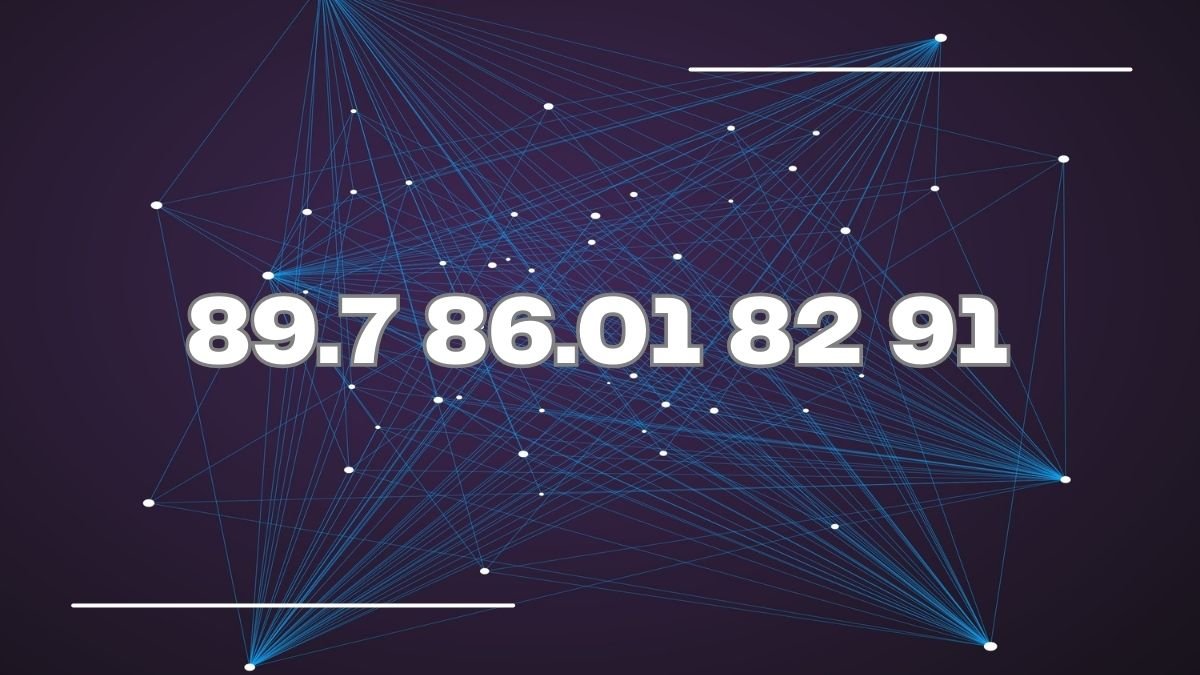In today’s data-driven world, numbers often hold significant meaning, whether in business, education, or personal achievement. The numbers 89.7 86.01 82 91 might appear as a random sequence to some, but to those who understand their context, they can represent benchmarks, goals, or milestones of success. This article delves into the significance of these numbers and how they could potentially be indicators of achievement in various fields.
The Importance of Numbers in Measuring Success
Numbers are powerful tools for quantifying success. Whether in academia, where grades determine academic standing, or in business, where profit margins reflect financial health, numbers are objective measures that provide clarity and direction. They allow us to set goals, track progress, and make informed decisions. Understanding the importance of numbers is the first step toward achieving success in any endeavor.
What Does 89.7 Represent?
The number 89.7 could symbolize various things depending on the context. In an academic setting, this could represent a grade percentage, indicating a high level of performance just shy of excellence. In a business scenario, 89.7 could be a satisfaction rating, suggesting that while the majority of customers are happy, there is still room for improvement. Understanding what this number represents in your specific context is crucial for leveraging it toward further success.
The Significance of 86.01
The number 86.01 might be interpreted as a specific benchmark or standard. For example, in the context of testing or evaluation, it could represent a cutoff point, where those scoring above this number are deemed successful, and those below are not. This could apply to standardized tests, job performance evaluations, or even customer satisfaction surveys. Recognizing the significance of this number helps in understanding what is required to meet or exceed expectations.
Understanding the Impact of 82
The number 82 often suggests solid, consistent performance. It might not be the highest score, but it is certainly above average, indicating a strong, reliable performance. In a professional setting, an 82 could represent a key performance indicator (KPI) that signifies competence and reliability. For students, an 82 might be a grade that shows they have a good grasp of the material, even if there is room for improvement.
The Benchmark of 91
A score or value of 91 often represents excellence. Whether it’s a test score, a performance review, or a satisfaction rating, 91 is typically seen as a mark of high achievement. It suggests that the person or entity has not only met but exceeded expectations. Understanding that 91 represents a high standard can be motivating, pushing individuals and organizations to strive for the best.
Using These Numbers as Motivational Tools
Numbers like 89.7 86.01 82 91 can serve as powerful motivational tools. They provide clear, measurable goals that can be worked toward. For instance, if you currently have an 82 in a particular area, aiming for an 89.7 can push you to work harder and improve. Similarly, if your goal is to achieve a 91, understanding what is required to reach that benchmark can help you focus your efforts more effectively.
The Role of Numbers in Personal Development
In personal development, numbers often play a crucial role in setting and achieving goals. Whether it’s weight loss, financial savings, or skill acquisition, having clear numerical goals can help guide your progress. Numbers like 89.7 86.01 82 91 can be used to track personal milestones, providing a clear picture of where you are and where you need to go.
Numbers in Academic Achievement
In education, numbers are often used to assess and compare academic performance. Grades, percentages, and test scores all provide a quantifiable measure of a student’s understanding and capabilities. Aiming for high numbers, such as 91, can encourage students to excel, while understanding what a 82 or 86.01 represents can help them set realistic goals for improvement.
The Business Perspective on Numbers
In the business world, numbers are critical for assessing everything from financial performance to customer satisfaction. Metrics like profit margins, market share, and customer ratings are all expressed numerically, allowing businesses to gauge their success and identify areas for improvement. Numbers like 89.7 or 91 could represent targets for customer satisfaction or profit goals, guiding business strategies toward success.
How Numbers Reflect Market Performance
In the stock market or other financial sectors, numbers are the language of performance. Stock prices, percentages, and indices all provide insights into market trends and company performance. Investors often look for specific numbers, such as a 91 or higher in stock ratings, as indicators of strong performance and potential for growth.
The Psychological Impact of Numbers
Numbers can also have a psychological impact, influencing how we perceive our own success and the success of others. For instance, seeing a high number like 91 can boost confidence and motivation, while a lower number might encourage introspection and the drive to improve. Understanding this psychological aspect can help individuals and organizations use numbers more effectively as motivational tools.
Numbers in Health and Fitness
In health and fitness, numbers are often used to track progress and set goals. Whether it’s body weight, BMI, or exercise repetitions, having clear numerical goals can help individuals stay focused and motivated. For example, aiming to increase a fitness score from 82 to 91 could be a powerful incentive to push harder in workouts and adopt healthier habits.
Educational Systems and Number Grading
Educational systems around the world use numbers to grade students’ performance. Numbers like 89.7 or 86.01 can determine a student’s academic future, affecting everything from college admissions to scholarship opportunities. Understanding the significance of these numbers helps students and educators alike in setting realistic goals and striving for academic excellence.
Using Numbers to Improve Performance
Improving performance often involves understanding and working with specific numbers. Whether it’s raising a grade from 86.01 to 89.7 or improving customer satisfaction from 82 to 91, setting numerical goals provides a clear path to follow. By focusing on these numbers, individuals and organizations can make targeted improvements that lead to success.
Conclusion:
Numbers like 89.7 86.01 82 91 are more than just figures; they are benchmarks that can guide us toward success. Whether in education, business, or personal development, understanding the significance of these numbers and using them to set goals can help us achieve our highest potential. By focusing on these numbers and striving to improve them, we can measure our, identify areas for growth, and ultimately achieve success.
FAQs
What does the number 89.7 86.01 82 91 signify in academic grading?
It represents a high level of performance, typically indicating that a student is doing well but can still improve to achieve excellence.
How can numbers like 86.01 be used in business?
Numbers like 86.01 can represent benchmarks or cutoffs in performance evaluations, helping businesses determine success or areas needing improvement.
Why is a score of 82 significant?
A score of 82 suggests solid, consistent performance, often above average, indicating reliability and competence.
What does a 91 rating indicate in customer satisfaction?
A 91 rating typically reflects a high level of customer satisfaction, indicating that the business is exceeding customer expectations.
How can understanding these numbers improve personal development?
By setting numerical goals based on these benchmarks, individuals can track progress, stay motivated, and achieve their personal development objectives.











